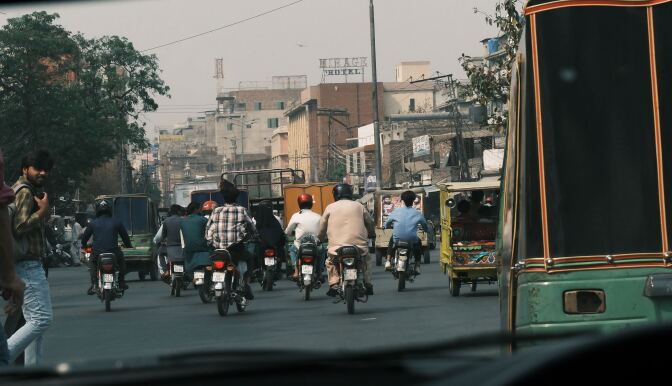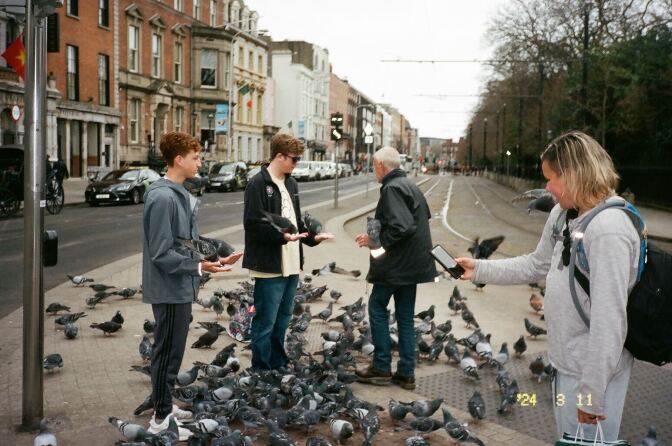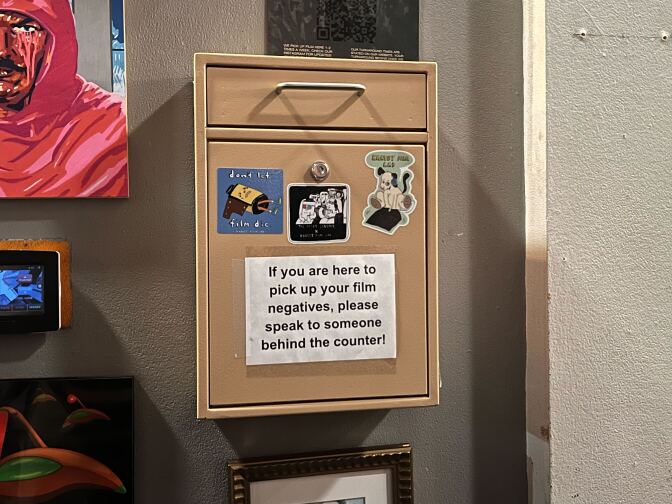This story is free to read because readers choose to support LAist. If you find value in independent local reporting, make a donation to power our newsroom today.
Looking for places to develop your film? Here’s our recommendations

Before digital cameras and smartphones became ubiquitous it was film photography that reigned supreme. Back in the day that meant a trip to your local film processing store to get those negatives developed. Today a convenient alternative is the local CVS Photo Lab. They can get you scans and digital prints, but they no longer return your negatives.
So if you want those originals back, and for a chance to engage with your local photography scene – here are some independent film developing shops in L.A. and O.C. hand-picked by LAist’s photography-loving staff.
Powell Camera Shop
160 West Badillo Street
Covina, CA 91723
First up our General Assignment Reporter Destiny Torres frequents this San Gabriel Valley location.
What do they develop?
They take standard 35mm and medium format 120mm film and can use both C-41 and E-6 processing.
What’ll it cost me?
It varies depending on what you want back. Just developing the negatives will run you $9.99 before taxes. If you want color digital scans as well as prints: between $15 and 20 dollars. If you prefer black and white scans in addition to prints: between $22 and $32, according to Frankie Barron, a manager of Powell.
How long does it take to develop?
Your best bet is to go in person as Powell rarely accepts mail in negatives. It should take a week to get your photos back. The store doesn’t develop photos on site but sends them to professional developers at Swan Photo Labs in San Clemente.

Samy’s Camera
1759 E. Colorado Blvd.
Pasadena, CA 91106
If you’ve ever been interested in cameras and you’ve spent some time in Pasadena chances are you’ve heard of Samy’s Camera. This recommendation comes from AirTalk producer Lucy Copp.
What do they develop?
The shop takes various film formats including 35mm, medium format 120mm. They can also develop 4 by 5 and 8 by 10 large format or sheet film.
What’ll it cost me?
35mm film will cost you $6 a roll for color, $8 a roll for black and white. For color photo scans in 35mm and 120mm the cost is around $12 for low resolution, $18 for medium resolution, and $25 for high resolution. Adding prints? For 24 photos it'll be between $9.96 and $10.83. Thirty-six photos will cost you between $13.44 and $13.73.
How long does it take to develop?
Negatives will take two to five business days. Prints and scans will take about a week to 10 days. Samy's lets you drop off negatives in store at their locations in Santa Ana, Pasadena and Fairfax. Negatives are sent to their photo lab in the Fairfax area for development, according to Pasadena employee Dana Mooradian. All 35mm and 120mm color film development is done at the Fairfax location. Black and white and large format are sent to the Icon lab in Los Angeles for development.
Analog Photomart
416 E 2nd St.
Los Angeles, CA 90012
Our Major Gifts Officer Malka Fenyvesi also frequents Samy’s, but recently she’s noticed a new store in Little Tokyo.
What do they develop?
The store is about a year old, owner Bryan Hong says they’re able to take color, black and white, and slide film in both 35 mm and 120mm.
What’ll it cost me?
Getting negatives developed will cost you $9. Add scans and the price goes up to $15 for low resolution, $18 for medium, and higher resolution for $23. Black and white development will cost a buck more across the board. 35mm prints will be $12 a roll. 120mm will cost the same for developing and scanning, but getting prints will only cost you $6.
How long does it take to develop?
This small neighborhood shop only accepts in store drop offs. They don’t do any business online. To get the scans to your e-mail takes 3 to 4 business days. To get negatives back it takes about a week, and up to 10 days for prints.

Berry Flash Photo Lab
11445 Jefferson Blvd.
Culver City, CA 90230
AirTalk Senior Producer Lindsey Wright is also a Samy’s regular, but lately she’s been going to a spot on the Westside.
What do they develop?
Berry Flash has you covered when it comes to 35mm and 120 mm, in either color or black and white. Negatives-only for 110mm. For 35mm you can choose between two different film processes, E-6 or C-41.
What’ll it cost me?
Standard color C-41 35mm processing will cost you $9.99. 120mm processing will be $14.99. Scans plus negatives for 35mm is $19.99 for “social friendly scans.” They also offer higher resolutions at $24.99. 120mm starts at $24.99, and $29.99 for high res. According to Berry Flash lab technician Natalia Delgado, if you want prints too just tack on an extra $10.
How long does it take to develop?
If you drop off your film at the main lab location in Culver City typical turnaround time is 2 to 3 business days for color negatives. Up to 10 days for black and white. You can also mail in your photos to Berry Flash Photo Lab. Their P.O. Box for mailing in film is:
Berry Flash Photo Lab
3019 Ocean Park Blvd., #370
Santa Monica, CA 90405

Tuttle Cameras
5467 E. Carson St.
Long Beach, CA 90808
AirTalk associate producer Manny Valladares loves to hit up this Long Beach location for both film developing and film gear.
What do they develop?
Tuttle Cameras can handle 35mm, 120mm, and 110mm film. Store associate Julian Lee says they process color, black & white, and slide for all formats as well.
What’ll it cost me?
Developing your 35mm film will cost $8.25. Adding scans will be $18.50. Tuttle offers different size files. Scans larger than 12 mb will run about ten dollars more each. Prints will cost anywhere between $12 and $18 depending on the number of exposures you want.
How long does it take to develop?
To get your negative scans back it’ll take around 1 to 2 days on weekdays and 2 to 3 days on weekends. You can drop your film off or mail it directly to the store. Tuttle partners with local developer Fromex for film processing.

Bill’s Camera
6022 Warner Ave.
Huntington Beach, CA 92647
Bill's an O.C. favorite that’s been around since 1971.
What do they develop?
According to lab manager Josh Ventura, Bill's can develop all color film in 35mm, 120mm and APS formats.
What’ll it cost me?
$6.50 for 35mm negatives and $7.50 for 120mm negatives. Add scans to those and it’ll be $13.95 for 35mm and $14.90 for 120mm. Including prints will cost you anywhere between an additional $13 and $16 depending on the roll and the format.
How long does it take to develop?
Ventura says the typical turnaround time for the negatives is 24 hours. 120mm will take two days. You are also able to mail your negatives into the shop. All color film development is done on site. Black and white film is sent to a third party.

The Frida Cinema/Harvey Film Lab
305 E 4th St #100
Santa Ana, CA 92701
Sticking with Orange County for our final recommendation. Why not see a movie as you drop off your negatives? The one-person development operation Harvey Film Lab has a drop box at Orange County’s only independent art house theater.
What do they develop?
Kacie from Harvey Film Lab says they can develop 35mm and 120mm film, in both color and black & white.
What’ll it cost me?
Basic scans for 35mm will start at $14.70, which includes getting your negatives back too. If you want prints it’ll be an additional $14.99.
How long does it take to develop?
Film is developed exclusively on site and takes one to 7 business days. You can mail your film to them directly, or purchase services online then head over to the Frida Cinema for drop off. For pick-up you can go in-person or have them mailed to you.
That’s it! Go forth and take your pictures! But remember to get your film developed as soon as possible for the best looking photos.








